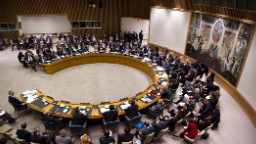From Ammar Abdulhamid and Ken Ballen, Special to CNN
 (CNN) –The U.N Security Council is considering the most important resolution yet on the brutal rule of terror that Syrian dictator Bashar al-Assad has unleashed on his people. The resolution, proposed by Morocco and supporting the Arab League’s plan, calls for al-Assad to leave power as the first step of a transition toward democracy.
(CNN) –The U.N Security Council is considering the most important resolution yet on the brutal rule of terror that Syrian dictator Bashar al-Assad has unleashed on his people. The resolution, proposed by Morocco and supporting the Arab League’s plan, calls for al-Assad to leave power as the first step of a transition toward democracy.
Yet even while U.N. deliberations are taking place, al-Assad is desperately trying to quash the protest movement by escalating violence to an unprecedented degree. Several Damascus suburbs have already been invaded by tanks and armored vehicles, while residential neighborhoods have been continually hit by mortars. In the rural areas of Homs, Hama, Idlib, Dera and Deir Ezzor provinces, clashes between loyalist troops and rebels are daily occurrences, with loyalist forces indiscriminately shelling protest hubs.
In the city of Homs, there are signs a full-scale attack is in the works against restive neighborhoods. The escalation of the bombardment of different neighborhoods seems designed to drive as many residents out before loyalist forces intensify their attacks, practically razing these areas to the ground.
Al-Assad is taking advantage of every moment of debate to perpetrate massacres. Indeed, his recent call on loyalists to continue to form local units to support the army and the security forces in their ongoing crackdown against protesters comes as a clear indication of the increasing difficulty the regime is facing.
Without external support, the protest movement has proven impossible to defeat, even for al-Assad’s machine of oppression, deemed by international human rights organizations as one of the worst in the Middle East. Ragtag defectors from the Syrian army and other civilians who have joined them have had to fight back.
Al-Assad is leaving his opponents with little choice. Either they have to settle for his version of reform, forever keeping the Syrian president and his inner circle in power and above the law, or, as he said recently, they are “terrorists” and will be struck with an “iron fist.” Al-Assad’s best defense at this stage is to play the hackneyed hand of dictators in the region threatening radicalism and sectarian strife. Only Russia and Iran still support this tactic.
With a Security Council resolution in hand, the world might have one final chance at imposing a peaceful resolution. After more than 5,000 people killed in 10 months of protest, the international community cannot continue to stand idly by.
If Russia exercises its veto at the Security Council on Thursday, the United States should call for an international conference on Syria, with the Arab League, the Islamic Conference, NATO, Japan, India, Brazil and all concerned states. This would be a viable path to legitimate multilateral action while circumventing the Russian veto. In fact, the United States should make clear to Russia immediately that in the event of a Russian veto, it will convene an international conference, so that any Russian veto will be a hollow gesture.
Syrian opposition coalitions, such as the Syrian National Council and the Antalya Conference for Change, and prominent independent dissidents should also be invited, so that they can endorse the outcome and legitimatize any international actions against the Syrian regime.
The protesters and all Syrians who yearn for freedom are un-ambivalent in their call for international intervention. America faces a fundamental choice. It can stand behind democratic aspirations fully, or it can continue to rely on 19th-century notions of power politics and influence.
Backing tyrants as a hedge against Islamist extremism has only resulted in fostering more extremism. While the course of history is never smooth or predictable, supporting freedom, democracy and individual dignity will, over time, provide the most stable model for prosperity and peace.






